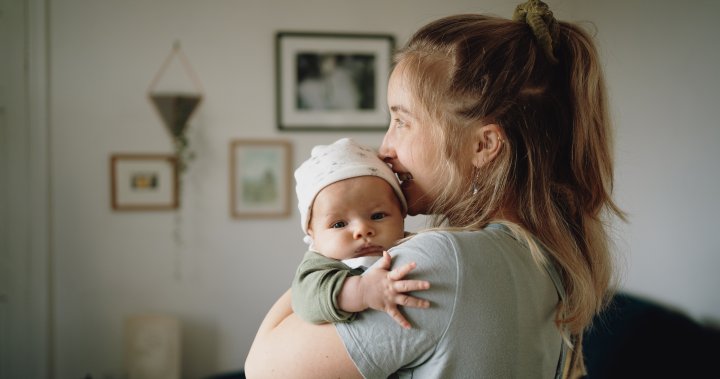Toronto mom Denise Kara says it “feels a bit deflating” returning to work after being on maternity leave for one year.
Before she went on leave, Kara said her career, working as a communications advisor at a Canadian bank was picking up with promotion opportunities on the horizon.
Being away from the workforce, the 32-year-old now finds herself with many question marks about where her career is headed next.
Kara gave birth to her firstborn, a daughter, in January last year.
“Just taking that year off, while it’s great spending time with my little one, I’ve had a really great time, it’s just hard trying to figure out where you fit back in once you re-enter the workforce,” she said in an interview with Global News.
On top of that, the new parents now also have daycare costs and other expenses to think about.
As part of the federal government’s Employment Insurance benefits, Kara was getting paid less than half of her salary during her maternity leave.
“I would say it was only enough because my spouse also works, so if we didn’t have his income in addition, it would be very tough, especially with inflation going up and again, being away for that year, you miss out on opportunities to increase your salary in a very meaningful way,” she said.
In Canada, those on maternity and parental leave get benefits of up to 55 per cent of their salary, with a maximum weekly pay of up to $668.
The birth parent is eligible for maternity leave for the first 15 weeks after the birth of a child. After that it switches to parental leave, with up to 40 weeks that can be shared between both parents.
Get the latest National news.
Sent to your email, every day.
Parents are also eligible for extended benefits up to 61 weeks for one parent and 69 weeks shared between both. In that case they get up to 33 per cent of their pay and a maximum of $401 weekly.
Giving the rising costs on top of the “steep penalty” for being away from work, women should get paid more during maternity leave, Kara said, adding that the current benefits “don’t keep pace with inflation.”
“I do think they need to increase pay for women when they’re on leave,” she said.
France, which saw the lowest number of births since World War Two last year, is planning to overhaul its parental benefits so that it pays better.
French President Emmanuel Macron made the promise earlier this week, although just how much of an increase that would result in is not clear.
In addition to basic maternity leave, French parents can currently take additional parental leave for one year with the possibility of renewing twice.
However, it only pays slightly more than 400 euros ($586) per month, which Macron said was a source of anxiety for some parents. He said it also cut mothers off from the labour market for too long.
Canada is already doing better than France on parental benefits, said Allison Venditti, founder of Moms at Work, an advocacy group that supports working mothers.
“Canada’s participation rate is above 80 per cent, which is really the highest we can we can hope for,” Venditti said in an interview with Global News, meaning that the majority of those in Canada who have children are eligible for parental benefits.
The option of extending parental leave to 18 months from 12 was introduced in Canada in 2017.
And in 2019, the federal government introduced a five-week, use-it-or-lose-it incentive for new dads to take parental leave and share the responsibilities of raising their young children.
Venditti said any reform in parental benefits, which comes under EI, seems counterintuitive, without tackling “bigger issues at play” like the cost of living, seniors’ care and the climate crisis that could be preventing people from having more children.
“Until we address those different things, I think that making changes to the parental leave system are sort of a moot point,”
Inflation, which rose to 3.4 per cent in December, a housing crisis and other financial pressures are leading some Canadians to think twice about having kids, said Don Kerr, a demographer who teaches at Kings University College at Western University.
“It’s been tight for a lot of people,” Kerr said in an interview with Global News. “The inflation certainly hasn’t helped as well. So for some couples, they’re looking at their paycheck and they’re looking at their expenses and they’re saying, well, maybe now’s not an ideal time to have kids.
Data shows it’s not cheap raising kids in Canada. A Statistics Canada report from Sept. 2023 showed that a middle-income family with two parents and two children spends on average $293,000 to raise one kid till the age of 17.
There’s also a cultural shift, with young people choosing not to have kids, Kerr said.
“For a lot of young adults, you get the impression that they’re thinking, ‘do I really want to bring a child into this world?’”
Like France, Canada’s fertility rate has been declining over the past decade.
In 2022, the number of babies born in Canada dropped to a 17-year-low, according to a StatCan report released in Sept. 2023.
The Canadian government is not specifically looking to increase parental leave pay, like France is, but the Office of the Minister of Employment, Workforce Development and Official Languages, said it’s an ongoing process of improvement.
“Helping Canadian parents is a core part of our strategy to empower the middle class and to lift people out of poverty,” said Mathis Denis, press secretary for Minister Randy Boissonnault’s office.
“As of a specific reform like France, we do not have a plan to do that, but we are always looking for ways to improve our system and be there for workers and parents from coast to coast to coast,” he said in an emailed statement to Global News.
Aside from boosting benefits, where Canada can improve is to provide better clarity to parents to help them navigate the parental leave process and that can in turn increase the uptake, Venditti said.
“The parental leave process remains confusing, incredibly confusing,” she said. “It needs to be a lot more clear.”
At Moms at Work, they have made several free resources available to try to overcome that.
— with files from Global News’ Touria Izri, Reuters and The Canadian Press.




